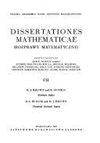分解空间的结构化、紧支持的巴拿赫框架分解
IF 0.8
3区 数学
Q1 MATHEMATICS
引用次数: 7
摘要
$\newcommand{mc}[1]{\mathcal{#1}}$ $\newcommand{D}{\mc{D}(\mc{Q},L^p,\ell_w^q)}$ 我们提出了构造结构化的,可能紧支持的Banach框架和分解空间的原子分解的框架。这样的空间$\D$是使用覆盖$\mc{Q}=(Q_i)_{i\in I}$的频率来定义的:如果$(\varphi_i)_{i}$是隶属于$\mc{Q}$的一个合适的统一分区,那么$\Vert g\Vert_{\D}:=\left\Vert\left(\Vert\mc{F}^{-1}(\varphi_i\hat{g})\Vert_{L^p}\right)_{i}\right\Vert_{\ell_w^q}$。我们假设$\mc{Q}=(T_iQ+b_i)_{i}$和$T_i\in{\rm GL}(\Bbb{R}^d),b_i\in\Bbb{R}^d$。给定一个原型$\gamma$,我们考虑系统\[\Psi_{c}=(L_{c\cdot T_i^{-T}k}\gamma^{[i]})_{i\in I,k\in\Bbb{Z}^d}\text{ with }\gamma^{[i]}=|\det T_i|^{1/2}\, M_{b_i}(\gamma\circ T_i^T),\]具有平移$L_x$和调制$M_{\xi}$。我们在$\gamma$上提供了可验证的条件,在此条件下,对于足够小的采样密度$c>0$, $\Psi_c$形成了一个Banach框架或$\D$的原子分解。我们的理论允许紧凑支持的原型,并适用于任意$p,q\in(0,\infty]$。通常,$\Psi_c$既是巴拿赫框架又是原子分解,因此分析稀疏性等同于综合稀疏性,即分析系数$(\langle f,L_{c\cdot T_i^{-T}k}\gamma^{[i]}\rangle)_{i,k}$位于$\ell^p$中,iff $f$属于某一分解空间,iff $f=\sum_{i,k}c_k^{(i)}\cdot L_{c\cdot T_i^{-T}k}\gamma^{[i]}$与$(c_k^{(i)})_{i,k}\in\ell^p$。如果只知道分析稀疏性是成立的,这是很方便的:通常,这只产生综合稀疏性,而不是对偶框架,而对偶框架通常知之甚少。但我们的理论产生了合成稀疏性,而不是我们熟知的原始框架。特别地,我们的理论适用于$\alpha$ -调制空间和inhm。贝索夫空间。它也适用于剪切框架,正如我们在同伴论文中所展示的那样。本文章由计算机程序翻译,如有差异,请以英文原文为准。
Structured, compactly supported Banach frame decompositions of decomposition spaces
$\newcommand{mc}[1]{\mathcal{#1}}$ $\newcommand{D}{\mc{D}(\mc{Q},L^p,\ell_w^q)}$ We present a framework for the construction of structured, possibly compactly supported Banach frames and atomic decompositions for decomposition spaces. Such a space $\D$ is defined using a frequency covering $\mc{Q}=(Q_i)_{i\in I}$: If $(\varphi_i)_{i}$ is a suitable partition of unity subordinate to $\mc{Q}$, then $\Vert g\Vert_{\D}:=\left\Vert\left(\Vert\mc{F}^{-1}(\varphi_i\hat{g})\Vert_{L^p}\right)_{i}\right\Vert_{\ell_w^q}$.
We assume $\mc{Q}=(T_iQ+b_i)_{i}$, with $T_i\in{\rm GL}(\Bbb{R}^d),b_i\in\Bbb{R}^d$. Given a prototype $\gamma$, we consider the system \[\Psi_{c}=(L_{c\cdot T_i^{-T}k}\gamma^{[i]})_{i\in I,k\in\Bbb{Z}^d}\text{ with }\gamma^{[i]}=|\det T_i|^{1/2}\, M_{b_i}(\gamma\circ T_i^T),\] with translation $L_x$ and modulation $M_{\xi}$. We provide verifiable conditions on $\gamma$ under which $\Psi_c$ forms a Banach frame or an atomic decomposition for $\D$, for small enough sampling density $c>0$. Our theory allows compactly supported prototypes and applies for arbitrary $p,q\in(0,\infty]$.
Often, $\Psi_c$ is both a Banach frame and an atomic decomposition, so that analysis sparsity is equivalent to synthesis sparsity, i.e. the analysis coefficients $(\langle f,L_{c\cdot T_i^{-T}k}\gamma^{[i]}\rangle)_{i,k}$ lie in $\ell^p$ iff $f$ belongs to a certain decomposition space, iff $f=\sum_{i,k}c_k^{(i)}\cdot L_{c\cdot T_i^{-T}k}\gamma^{[i]}$ with $(c_k^{(i)})_{i,k}\in\ell^p$. This is convenient if only analysis sparsity is known to hold: Generally, this only yields synthesis sparsity w.r.t. the dual frame, about which often only little is known. But our theory yields synthesis sparsity w.r.t. the well-understood primal frame.
In particular, our theory applies to $\alpha$-modulation spaces and inhom. Besov spaces. It also applies to shearlet frames, as we show in a companion paper.
求助全文
通过发布文献求助,成功后即可免费获取论文全文。
去求助
来源期刊
CiteScore
2.80
自引率
0.00%
发文量
8
审稿时长
>12 weeks
期刊介绍:
DISSERTATIONES MATHEMATICAE publishes long research papers (preferably 50-100 pages) in any area of mathematics. An important feature of papers accepted for publication should be their utility for a broad readership of specialists in the domain. In particular, the papers should be to some reasonable extent self-contained. The paper version is considered as primary.
The following criteria are taken into account in the reviewing procedure: correctness, mathematical level, mathematical novelty, utility for a broad readership of specialists in the domain, language and editorial aspects. The Editors have adopted appropriate procedures to avoid ghostwriting and guest authorship.

 求助内容:
求助内容: 应助结果提醒方式:
应助结果提醒方式:


